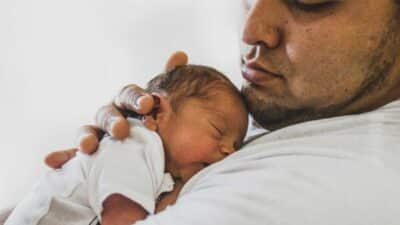Sperm donation
Reasons for sperm donation
There are many different reasons for sperm donation. For heterosexual couples, for example, sperm donation can be considered if the man is infertile or has limited fertility and previous attempts at assisted reproduction have been unsuccessful. The reason can also be a hereditary disease of the man, which should not be passed on to the child. However, sperm donation can also be an indispensable step on the way to having a child for lesbian couples and singles who wish to have a child. Sperm donation has been medically possible for over 100 years. Accordingly, the level of awareness is high: 97% of all women and 96% of all men have already heard about it [1].
Opened vs. anonymous sperm donation
Before deciding to donate sperm, there are often many legal questions to be answered. One of the most burning questions is often the question of biological identity. What happens if the donor child wants to know his biological father, or vice versa, a donor wants to know his biological child? Basically, a distinction is made between open and anonymous sperm donation (sometimes also called YES donor and NO donor). In Germany, only open sperm donation is permitted. The reason for the legislation in Germany is that the Federal Constitutional Court gives greater weight to the right to know one’s own parentage than to the donor’s right to anonymity. In other European countries, both types of legislation can be found.
Germany: Donor data must be kept for 110 years
In Germany, the law on “knowledge of parentage in the case of heterologous use of semen” was also enacted on the 17th of July 2017 and came into force on the 1st of July 2018. This law states that the names and data of all sperm donors in Germany must be kept in the so-called Sperm Donation Register of the German Institute for Medical Documentation and Information — for 110 years [2].

How are donors selected?
First of all, we have to distinguish between the legal minimum requirements and the internal quality standards of the clinics. Again, the legal requirements differ from country to country. In Germany, for example, only donors between the ages of 18 and 40 are accepted. Fertility as well as physical and mental health must be proven. Chronic or hereditary diseases such as epilepsy, heart problems, asthma, etc. are also excluded. Finally, the sperm donors must be tested for sexually transmitted diseases such as HIV, hepatitis and other infections [3]. Furthermore, many clinics impose additional standards for the sperm donors, so that the programs differ from clinic to clinic.
Legal requirements for sperm donors in Germany
- Age between 18 and 40
- Proven fertility
- Proven physical & mental health
- No venereal diseases
Sperm donation: Costs
Depending on the type of treatment and the choice of sperm bank (German or Danish), the costs vary greatly. Your personal advisor will be happy to help you with your choice.
About Fertilly
At Fertilly, we have made it our mission to accompany couples (homosexual and heterosexual) and singles on the way to fulfilling their child wish. In doing so, it is important to us to create transparency in the area of fertility services, to provide information and knowledge on the topics of pregnancy and fertility and to help you to find the most suitable Fertility Center. Through cooperation with first-class Fertility Centres and clinics in Europe, enquiries about Fertilly are given preferential treatment. This means that our patients avoid the usually long waiting times and get appointments more quickly.
If you would like more information about Fertility Centers, success rates and prices, please contact us using this questionnaire. We will advise you free of charge and without any obligation.
-
Answer the first questions in the online form in order to book an appointment. This way we can better address your needs during the conversation.
-
We will find the best contact person for your individual needs. Schedule 20 minutes for the consultation.
-
We will introduce you to the right fertility clinic from our network, make an appointment and accompany you until your wish for a child is fulfilled.
Sources:
- Prof. Dr. Wippermann, C. (2015) — https://www.bmfsfj.de/blob/94130/bc0479bf5f54e5d798720b32f9987bf2/kinderlose-frauen-und-maenner-ungewollte-oder-gewollte-kinderlosigkeit-im-lebenslauf-und-nutzung-von-unterstuetzungsangeboten-studie-data.pdf
- Bundesgesetzblatt, Gesetz zur Regelung des Rechts auf Kenntnis der Abstammung bei heterologer Verwendung von Samen (2017) — https://www.bgbl.de/xaver/bgbl/start.xav#__bgbl__%2F%2F*%5B%40attr_id%3D%27bgbl117s2513.pdf%27%5D__1559661113027
- Bundesärztekammer, Richtlinie zur Entnahme und Übertragung von menschlichen Keimzellen im Rahmender assistierten Reproduktion (2018) — https://www.bundesaerztekammer.de/fileadmin/user_upload/downloads/pdf-Ordner/RL/Ass-Reproduktion_Richtlinie.pdf











